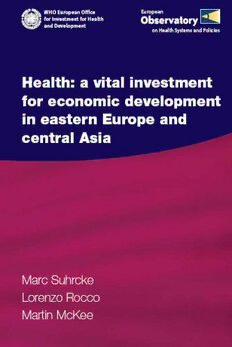
Health: A Vital Investment for Economic Development in Eastern Europe and Central Asia PDF
280 Pages·2007·2.122 MB·English
Most books are stored in the elastic cloud where traffic is expensive. For this reason, we have a limit on daily download.
Preview Health: A Vital Investment for Economic Development in Eastern Europe and Central Asia
Description:
The breakdown of the socialist system in the late 20th century gave some of the affected countries the opportunity to establish the prerequisites for sustainable economic development and improved human welfare. However, for others, the dramatic economic decline experienced during the transition years resulted in widespread poverty. Despite some improvement since then, over 60 million people remain poor and more than 150 million are economically vulnerable in the countries of central and eastern Europe and the Commonwealth of Independent States (CEE-CIS).This report is the first comprehensive effort to analyse the economic impact of ill health in the CEE-CIS Region, and much of the evidence it presents about the economic implications of chronic disease - growing rapidly in many low- and middle-income countries - is also relevant beyond the original geographical focus.Health: a vital investment for economic development in eastern Europe and central Asia explores the interdependence of health and economic development, focusing on the Region's significant economic burden of ill health. It also, simultaneously, advocates evidence-based, cost-effective interventions and strategic decisions at the national and international levels as a crucial means to achieving sustained economic growth and poverty reduction in the Region.The authors:Marc Suhrcke is an economist in the WHO Regional Office for Europe in Venice, Italy.Lorenzo Rocco is Assistant Professor of Economics at the University of Padova, Italy.Martin McKee is Professor of European Public Health at the London School of Hygiene & Tropical Medicine, and Research Director at the European Observatory on Health Systems and Policies.
See more
The list of books you might like
Most books are stored in the elastic cloud where traffic is expensive. For this reason, we have a limit on daily download.
